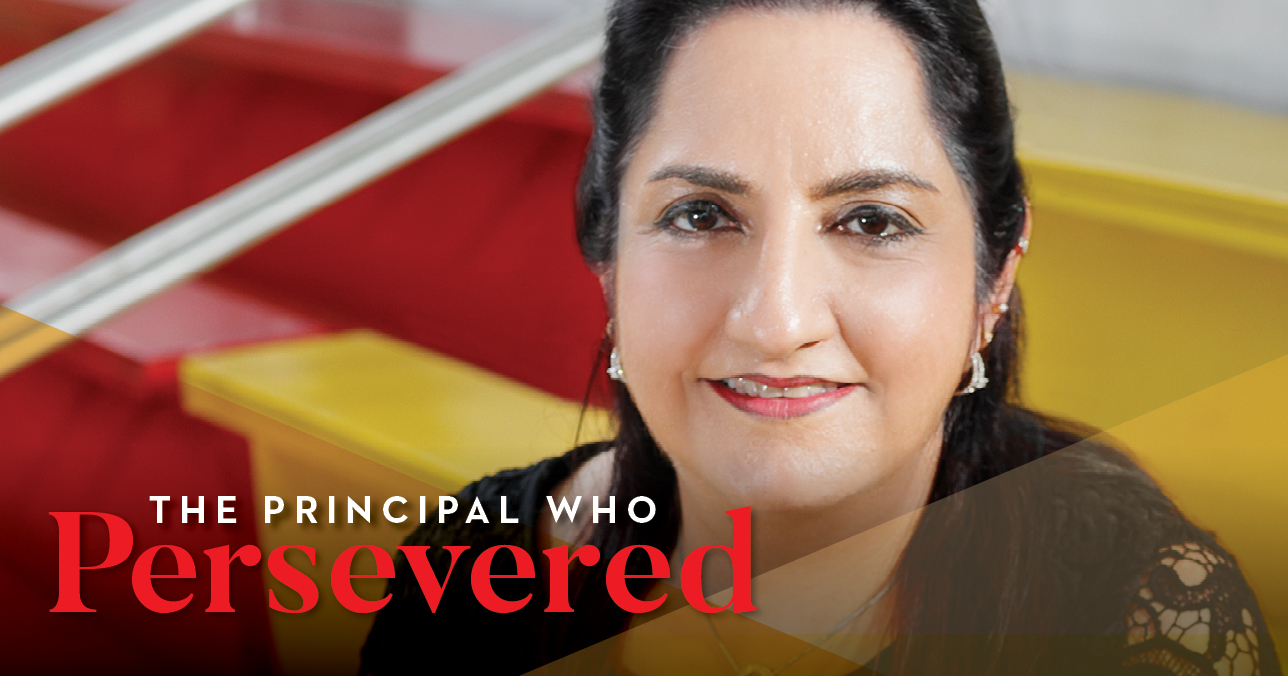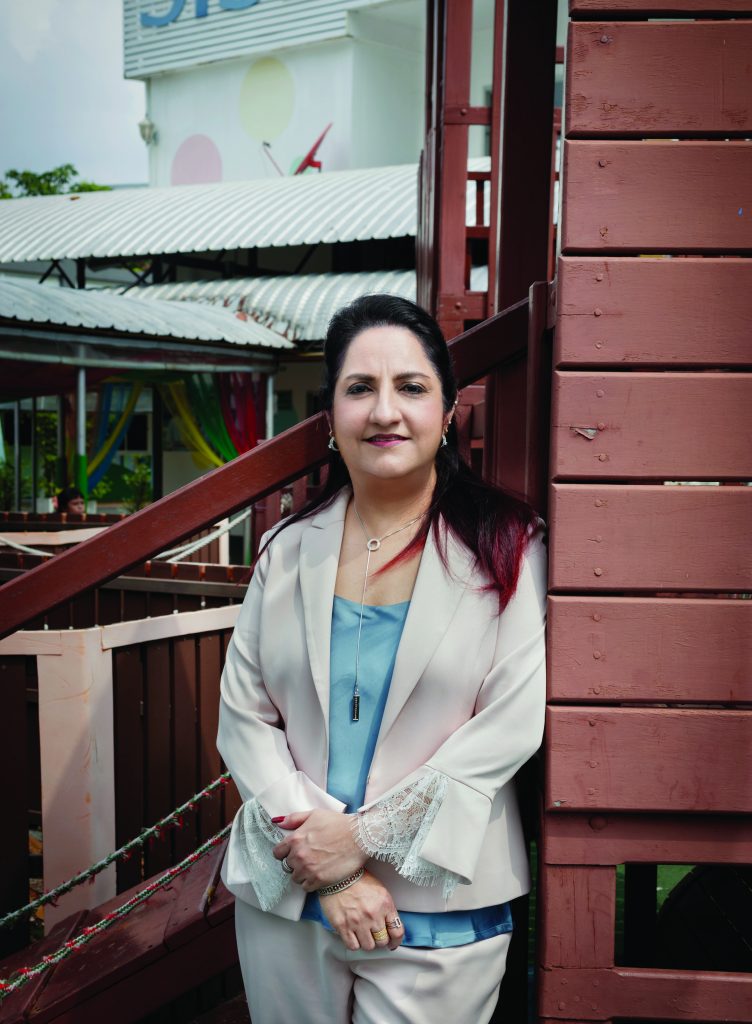Educator Narisa Lertnamwongwan opens up about the hardships she has overcome to reach success.
By Shruti Kothari
Overseeing five nursery kindergartens, two with primary schools, as the Executive Principal is a daunting task, but Narisa Lertnamwongwan deals with challenges head-on. As the head of Singapore International School of Bangkok, with campuses in Pracha Uthit, Ekkamai, Suvarnabhumi, Chiang Mai and most recently Thonburi, Narisa’s work encompasses a variety of tasks, including making executive decisions, creating curricula, and recruiting and training other educators.
The most incredible factor, however, is the obvious passion she puts into her 19-year-old career on a daily basis. As we walk around the Ekkamai campus, she greets each child by name, and their reception of her is both warm and respectful, a testament to the intimate and nurturing atmosphere she has built. This palpable accomplishment is put further into perspective as she tells us about her journey to success.
How did you begin your journey in the field of education?
I graduated college with a hospitality degree — a choice that was not mine, but at the time I didn’t have many options, as my parents refused to send me abroad for university because I was a girl child. They had already taken a big risk by sending me to the International School of Bangkok (ISB) at a time when very few Indian kids were enrolled.
I got married the same year I graduated, at the age of 22. It ended in a very messy divorce when I was only 27, and I had two daughters under the age of five to raise alone. I moved to Singapore to get away from the situation. I enrolled in a university to study psychology, and went through a Montessori Teacher Training Certification simultaneously. It was to keep myself busy and find my way financially so I could raise my kids, until I realised that child development was my calling. On weekends, I joined a small Montessori that was started up from scratch by a Buddhist family. That was where my journey began as an educator.
I needed to prove to myself that I was not a failure even though my marriage failed.”
What kept you so deeply invested in it?
At first it was survival, the need to earn a living on my own for my kids. In addition, my self-confidence had taken a nosedive and I needed to prove to myself that I was not a failure, even though my marriage failed. I kept telling myself that the education I received during my time was rare, and not succeeding would be an insult to my parents. However, the deeper I got into it, the more I realised that there was nothing else that would matter more to me than educating. I was exactly where I was supposed to be, doing what I was meant to be doing, and for that, I was grateful.
You had a lot of responsibility on your shoulders. How did you balance your work and home life?
There is no balance — most working women will agree with me. If you choose a career, for whatever reason, you need a strong home support system, be it family or caregivers in a childcare centre. I was lucky; I had my parents and my family in Singapore who not only supported me emotionally but made a home for my girls. Even today, I know I could have been a better mother, but life had other plans. My career was initially an escape, and then a necessity to raise my girls. At the end of the day, you have to make an active choice about what matters, and then do your best.
What were some of the hardest moments in your career?
The hardest was knowing that I was capable of doing something but was not given the chance. As a foreigner in Singapore, my work options were limited, therefore I took what I got. To get by, I worked several jobs while pursuing my psychology degree, Montessori accreditation, and a diploma in business management.
I was once a part-time manicurist at a nail salon, which was difficult to accept as an ISB graduate, especially since all of my peers were soaring. However, my mom was my inspiration. She told me that being privileged did not mean that you couldn’t work for a living in any way you had to, as long as you were working hard. Because of her support, I became stronger, step by step. Over the years, I was reminded time and time again that you do not reach the top without hard work, so I took whatever came my way to reach where I am today. Not one part of that was easy, but it had to be done.
Are there any specific moments that have made all of the hard work worth it?
Each step upward in attaining my Montessori Diploma, second bachelor’s in Psychology, and my teaching jobs, made it worthwhile. Being able to send my children to school with my hard-earned money was also a huge personal triumph. And finally, being recognised as a successful educator time and time again makes it meaningful. I make a difference in children’s lives. I will never forget when one of my students turned to me and said, “Teacher, I love you,” and refused to go home — that was the best validation.
As an educator, do you have any advice for students and parents?
For all students, always look, listen, think and learn — don’t let the learning process stop at school. Grow in all aspects of your life, whether it’s education, developing a skill, or as a human being. To parents, you need to grow with your children and be mindful of what you are exposing them to. Remember that your kids are a reflection of you and how you raise them, so try to be the best role models you can be, whether professionally or personally.
Do you have any mottos or mentors that have guided you?
What doesn’t kill you makes you stronger. My kids are probably sick of hearing it but it’s something I say and live by a lot. I also rely on the simple motto of live and let live. I believe that respect is mutual so give it first to get it, even to little children.
My mentor was my mum because I don’t think I’ve met a stronger woman. She was way ahead of her time, and stood firm and tall for her family through the best and worst. Professionally, I see my current bosses as my biggest mentors. They have been amazing in giving me opportunities and putting their faith in me.
Has the field changed much since you’ve begun this profession?
In the past 19 years, the change has been phenomenal, not only in the type of education, but also in the way children learn. Education is no longer about going to school and listening to the teacher. It is now about being encouraged to think and learn independently. Nontraditional methods such as project- based learning, outdoor learning, and a more holistic approach to development are trending. Thanks to the values fostered by my own educational experience, I was able to adapt to the fast-changing trends and gradually implement them in my field of work.
How do you see the future of education?
It is outside the classroom. Although the traditional methods are fading, the basics of learning to read and write never have and never will change, it is just a question of how that is taught. You must think and learn beyond books and classrooms, and actually have hands-on experiences implementing what you’ve learnt. Without skills, theory is useless, and that’s what higher education is moving towards — cultivating skills.
Just today, a teacher told me that she had changed the entire arrangement of furniture in her class, but none of the students batted an eyelid. Instead, a child came up to her and said, “Teacher, you have a new iPhone X?” She responded, “Yes, let’s learn about its functions and some new vocabulary. Who can explain to me what a software update is?” Change is happening, and children are adapting. It is time educators do too.
What are your professional and personal goals going forward?
I have reached my professional goal. I thought my life was over the day my marriage fell apart — it was all that mattered at the time. With two little kids and no professional experience, I had to start from scratch at the age of 27. Little did I know that one day I would be heading five campuses of an incredible institution. It has been an exhausting and difficult journey, but I couldn’t be happier about where I am today. I want to keep learning and making a difference in the lives of children for as long as I can.
My most important personal goal is to see both my girls successful in their careers and personal lives. This way, I will feel fulfilled both as a career-oriented woman and as a mother.









